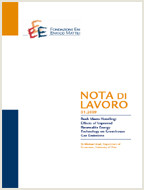Priority for the Worse Off and the Social Cost of Carbon

05.08.2016
Matthew Adler (Duke University School of Law); David Anthoff (Energy and Resources Group – University of California); Valentina Bosetti (Bocconi University); Greg Garner (The Pennsylvania State University); Klaus Keller (The Pennsylvania State University, Carnegie Mellon University); Nicolas Treich (INRA – University of Toulouse)
Q54, I30
Prioritarianism, Social Welfare Function, Social Cost of Carbon
Mitigation, Innovation and Transformation Pathways
Massimo Tavoni
The social cost of carbon (SCC) is a monetary measure of the harms from carbon emission. Specifically, it is the reduction in current consumption that produces a loss in social welfare equivalent to that caused by the emission of a ton of CO2. The standard approach is to calculate the SCC using a discounted-utilitarian social welfare function (SWF)—one that simply adds up the well-being numbers (utilities) of individuals, as discounted by a weighting factor that decreases with time. The discounted-utilitarian SWF has been criticized both for ignoring the distribution of well-being, and for including an arbitrary preference for earlier generations. Here, we use a prioritarian SWF, with no time-discount factor, to calculate the SCC in the integrated assessment model RICE. Prioritarianism is a well-developed concept in ethics and theoretical welfare economics, but has been, thus far, little used in climate scholarship. The core idea is to give greater weight to well-being changes affecting worse off individuals. We find substantial differences between the discounted-utilitarian and non-discounted prioritarian SCC.
***
Suggested citation: Adler, M., D. Anthoff, V. Bosetti, G. Garner, K. Keller, N. Treich, (2016), ‘Priority for the Worse Off and the Social Cost of Carbon’, Nota di Lavoro 55.2016, Milan, Italy: Fondazione Eni Enrico Mattei
